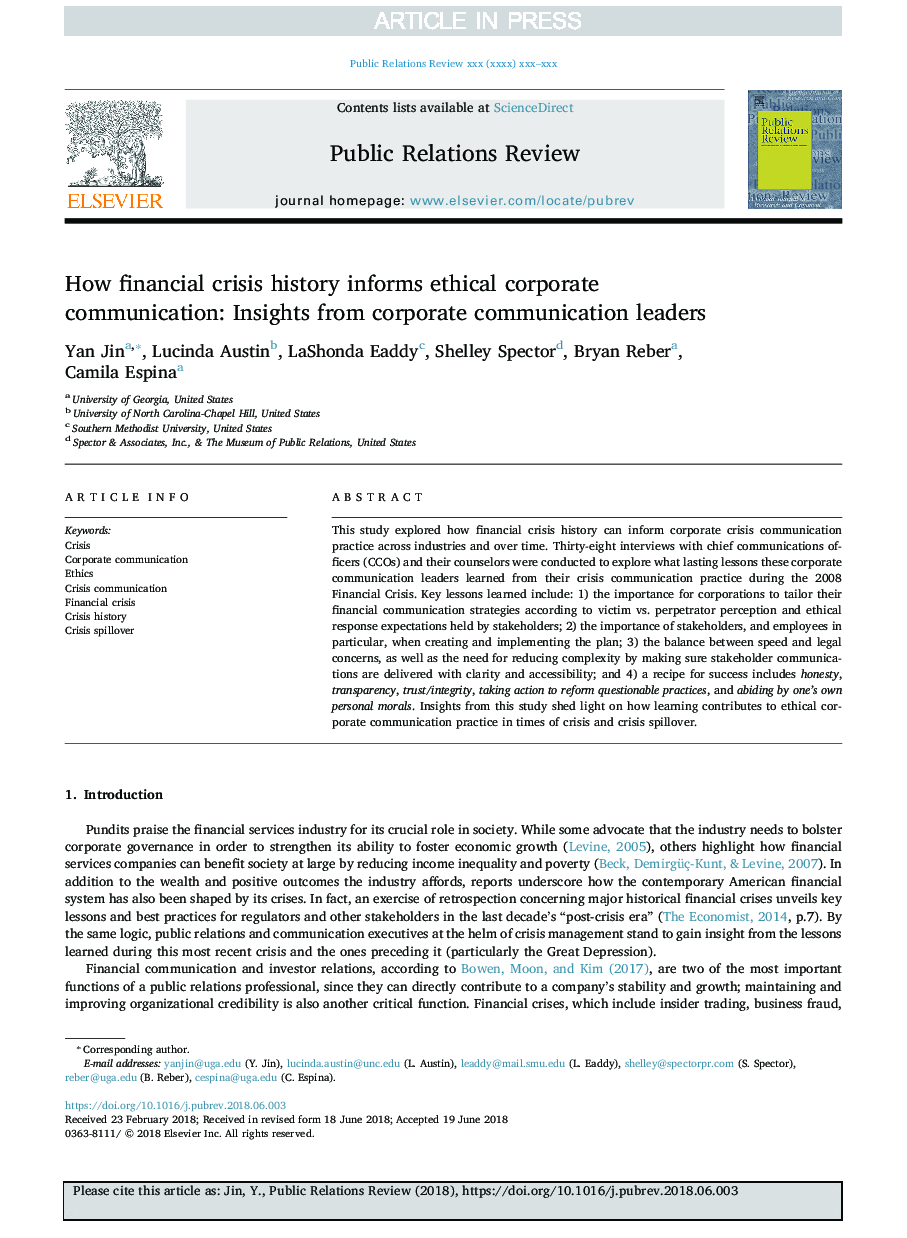| کد مقاله | کد نشریه | سال انتشار | مقاله انگلیسی | نسخه تمام متن |
|---|---|---|---|---|
| 10225080 | 1701150 | 2018 | 11 صفحه PDF | دانلود رایگان |
عنوان انگلیسی مقاله ISI
How financial crisis history informs ethical corporate communication: Insights from corporate communication leaders
ترجمه فارسی عنوان
چگونه تاریخچه بحران مالی به ارتباطات اخلاقی شرکت ها می پردازد: بینشی از رهبران ارتباطات شرکتی
دانلود مقاله + سفارش ترجمه
دانلود مقاله ISI انگلیسی
رایگان برای ایرانیان
کلمات کلیدی
بحران؛ ارتباطات سازمانی؛ اخلاق؛ ارتباطات بحران؛ بحران مالی؛ تاریخچه بحران؛ گسترش بحران
ترجمه چکیده
این مطالعه به بررسی اینکه چگونه تاریخچه بحران مالی می تواند عمل ارتباطات بحران در صنعت را در سراسر صنایع و در طول زمان مورد توجه قرار دهد. بیست و هشت مصاحبه با افسران ارتباطات اصلی و مشاوران آنها انجام شد تا کشف کنند که چه درس های پایدار این رهبران ارتباطات شرکتی در طی بحران مالی سال 2008 از طریق فعالیت های ارتباطات بحران آنها را یاد گرفتند. درسهای کلیدی آموخته شده عبارتند از: 1) اهمیت شرکت برای تنظیم استراتژی های ارتباطی مالی خود را با توجه به قربانی در مقابل ادعای عاملان و انتظارات اخلاقی پاسخ های ذینفعان؛ 2) اهمیت ذینفعان و کارمندان مخصوصا هنگام ایجاد و اجرای طرح؛ 3) تعادل بین سرعت و نگرانی های قانونی، و همچنین نیاز به کاهش پیچیدگی با اطمینان از ارتباطات ذینفعان با وضوح و دسترسپذیری تحویل داده می شود؛ و 4) دستورالعمل موفقیت شامل صداقت، شفافیت، اعتماد / صداقت، اقدام به اصلاح رفتارهای مشکوک و رعایت اخلاق شخصی خود است. بینش های این مطالعه نشان می دهد که چگونه یادگیری در فعالیت های اخلاقی ارتباطات شرکتی در زمان بحران و بحران موجب می شود.
موضوعات مرتبط
علوم انسانی و اجتماعی
مدیریت، کسب و کار و حسابداری
بازاریابی و مدیریت بازار
چکیده انگلیسی
This study explored how financial crisis history can inform corporate crisis communication practice across industries and over time. Thirty-eight interviews with chief communications officers (CCOs) and their counselors were conducted to explore what lasting lessons these corporate communication leaders learned from their crisis communication practice during the 2008 Financial Crisis. Key lessons learned include: 1) the importance for corporations to tailor their financial communication strategies according to victim vs. perpetrator perception and ethical response expectations held by stakeholders; 2) the importance of stakeholders, and employees in particular, when creating and implementing the plan; 3) the balance between speed and legal concerns, as well as the need for reducing complexity by making sure stakeholder communications are delivered with clarity and accessibility; and 4) a recipe for success includes honesty, transparency, trust/integrity, taking action to reform questionable practices, and abiding by one's own personal morals. Insights from this study shed light on how learning contributes to ethical corporate communication practice in times of crisis and crisis spillover.
ناشر
Database: Elsevier - ScienceDirect (ساینس دایرکت)
Journal: Public Relations Review - Volume 44, Issue 4, November 2018, Pages 574-584
Journal: Public Relations Review - Volume 44, Issue 4, November 2018, Pages 574-584
نویسندگان
Yan Jin, Lucinda Austin, LaShonda Eaddy, Shelley Spector, Bryan Reber, Camila Espina,
